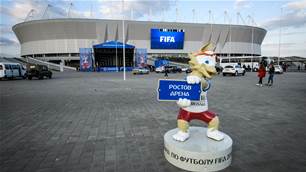He may be turning 30, but MK Dons manager Karl Robinson is adamant you judge him on his merits, not his age. Good thing he’s a top boss then...
Karl Robinson can't wait until his birthday. It's not the prospect of party hats or cake getting the MK Dons gaffer excited, mind. The youngest man ever to obtain a UEFA Pro Licence or coach in the Football League hits 30 on September 13 - and he's hoping that the digit might help take a little bit of focus away from the fact that, in managerial terms, he's hardly out the womb. "Avram Grant came up to me after our recent friendly against West Ham and he said, ‘Young man, you played very, very good football'." While the boss accepted the compliment graciously, he admits he baulked at the ‘y' word. "I hate that - ‘young man'," he winces. "I want to be respected. The second I fail, the emphasis is going to be on my age."
Failure isn't presently on Robinson's agenda. We meet him the morning after the Dons' win over Dagenham & Redbridge in the first round of the Carling Cup, which has extended their unbeaten start to the season. It's officially a day off, but playing and coaching staff alike are flitting around Stadium:MK with a post-match glow. New player-coach Didi Hamann offers a handshake, as does coach Alex Rae. It's a pleasant environment, and one that's a million miles away from the image fans from outside the club may maintain post-Wimbledon.
Robinson is sporting a crisp, off-the-peg suit, adding to the sense of maturity he wants people to see in him sooner rather than later. But he really shouldn't worry. Fresh-faced he may be, but his CV boasts better credentials than many a grizzled manager twice his age - and he's clearly hungry to soak up experience wherever he can. "I did my first coaching badge when I was 18 at Swindon, and my pro license when I was out in Ireland this summer," says the amiable Scouser. "I haven't had a summer off for 10 years because I'm always on courses. Fitness, diet, psychology. My wife has begged me for next summer off and I agreed... but a course has just come up at Warwick University." We hope that Mrs Robinson is a patient woman. Her husband is a man on a mission.
"50 per cent of the players were older than me"
It could have all been so different for Robinson. An Everton schoolboy alongside Franny Jeffers, Leon Osman and Tony Hibbert (all still playing), Robinson's apprenticeship took him to Swindon, only for a back injury to call time on his professional career at 18. He turned out in the lower leagues for Marine and Rhyl, but rather than wallowing in despair over lost opportunities, Robinson pushed himself into coaching. After a chance meeting with Steve Heighway, Liverpool's Academy Director invited him to help coach kids from eight to 18. "I was happy," recalls the boyhood Liverpool fan. "I never aspired to get to the top this quickly. I never wanted to leave the club. I saw myself as staying there and becoming Academy Director myself one day, maybe at 40."
The Merseyside club, from Shankly to Carragher, still shapes his philosophy. "The club's ethos blew me away," he adds. "That ability to have class about you in victory and also defeat; to have morals and standards. And from the moment I walked through the doors it was pass, pass, pass. If you couldn't retain the ball, you weren't a Liverpool player. I've read every book and seen every DVD on Bill Shankly. I adored the man. I'd ask Steve questions about him all the time! Shankly understood there was no one bigger than the club, and that the link from terrace to pitch was unquestionable. I'm trying to embrace that as a manager."
With Heighway's departure (the result of an Academy cull by Rafa Benitez) Robinson worked with Peter Hamberg, a former coach with Swiss club Grasshoppers. "From pass, pass, pass under Steve, it was now take him on, take him on, take him on with Peter," Robinson smiles. "I was learning so much." And on Merseyside Robinson cultivated a crucial friendship: Paul Ince, whose son, Thomas, was a member of the academy. When Ince was appointed MK Dons boss for 2007/08 season, Robinson was invited down as first-team coach. It was a watershed moment. "I'll forever be indebted to Paul for giving me the chance," he says. "If it wasn't for him, I wouldn't be here now. I got to coach first-team professional players on a daily basis, and I thrived. I took to the club and the area straight away - it smacked of ambition. We won the double (League Two and the Football League Trophy) that season."
When Ince was lured back to the Premier League by Blackburn, he took Robinson with him. It was a leap of faith by the Ewood Park hierarchy. "I came in with Archie Knox as first-team coach. I was 27, and 50 per cent of the players were older than me!" recalls Robinson. "They had the likes of Santa Cruz, Tugay, Benni McCarthy, Ryan Nelsen, Stephen Warnock, Brad Freidel. Top players. On my first day, I put on a passing session none of them understood! Once they got to grips with it, they enjoyed it. I was accepted."
Ince's tenure at Blackburn was brief, however. Three wins from 17 games resulted in the sack just six months into the job. His entire backroom staff also departed - except one. Robinson admits it was a surreal few days. "After Paul left I was asked to take training, but we'd got to Wednesday and I was holding everything together, praying the club would make an appointment quickly!"
Sam Allardyce was appointed to the club on the Thursday, and Robinson thought he'd be sacked. "Why would Sam keep me on?" he admits. "But I then got a call saying ‘Hi, it's Sam.' We chatted for about five minutes until the voice started laughing. It was Robbie Fowler on one of his wind-ups! Five minutes later Sam did call. I thought it was Robbie again and had a right go back at him, but Sam saw the funny side and asked me to take training again the next day. I never looked back. I'm not saying this to win brownie points but Sam is the best English manager out there."
Continued on next page...
"Sam Allardyce is a genius"
Allardyce's reputation for building long-ball, physical teams is unjust, says Robinson. "He's a genius. He makes you feel 10 feet tall. I learnt so much: set-pieces, in possession, out of possession; how to prepare and how every single detail mattered. Sam rounded me. It was hard to leave him."
Yet the lure of the Dons, and Ince, for a second time proved too strong last summer. "Paul offered me the assistant manager's job and I thought it was the correct career move," says Robinson. "I'd gone as far as I could as a coach - the Premier League - but I wanted to take the next step. Sam thought I'd stay, and he probably still thinks I made the wrong decision. But we still talk and I hope he's proud of what I've done."
Ince, meanwhile, found it difficult to replicate former glories. Last season proved to be frustrating, and following a 12th place finish, club and manager parted company again. Robinson was left holding the baby once more. "When Paul resigned, I was shocked," he reveals. "He said to me that he was not the right man, and he told the chairman [Pete Winkleman] that I should be the manager. He told me to stay and prove what I could do. I also received a ringing endorsement from Robbie Fowler, who said I was one of the best coaches he'd worked under. I'm not ashamed to admit that Robbie was a hero of mine, so to hear that blew me away. It also showed that despite my age, I must be doing something right."
Having overseen the final three games of last season, Robinson set out his proposals to Winkleman in relation to taking on the role full time. He highlighted not only his strengths but his weaknesses, and ensured the chairman that he'd surrounded himself with men who had the experience he lacked.
Enter John Gorman (assistant manager) and Dietmar Hamann (player-coach). "John is the best at what he does, having assisted Glenn Hoddle with England and managed Swindon in the Premier League," says Robinson. "I knew Didi through my time at Liverpool and I wanted an experienced holding midfielder. He played for Germany and we're extremely lucky to have him. He wants to start coaching - we've given him that platform. The lads have been inspired by his presence. If he can play 35 games this season, we'll have a great chance."
Early indications of a successful partnership between manager, coach and club came during pre-season when the Dons scored 20 goals in seven friendlies, and performed admirably against Birmingham and West Ham. And while Robinson's approach is more Anfield than Ewood, Allardyce's influence remains. "I had no nerves the first morning of the season [before the Wallsall game]," says Robinson. "I was prepared. I leave nothing to chance. That enables me to relax. I'll have a laugh but then I'll come away from the dressing room, whereas last year I would stay in there."
"I want to care for and respect the players," he continues. "They mean so much to me, and I would never lie to a player. I'll say anything to their face, but I'm also very calculated and precise in what I say. You can't always be nice, and sometimes I flip. You've got to have aggressiveness, but it's all about picking the right time. At half-time, I come in the manager's office for two minutes first. I'll write down the good points and the bad points. Why overload them? The last thing you say is what they remember."
With six managerial appointments in six years at Milton Keynes, Robinson knows failure will be dealt with ruthlessly. "If you ask me where I want to be in a year's time, I'd say still in a job! But I want to get this club out of this league: we deserve to be higher." That brings him round, inevitably, to the dreaded age issue again. "If we fail, someone will say it is because I lack experience. It annoys me when people say I haven't got that - just look at the people around me. I'll do everything I can to ensure that it doesn't happen. But saying that, I'm looking forward to hitting 30!"
Considering how much he's packed into the last decade, rival managers should be very afraid of what Karl Robinson might manage to achieve in his thirties.
Related Articles

Argentina Football Association Arranges Head Coach Sampaoli's Exit Terms - Reports

Southgate not judging Kane for England's loss













